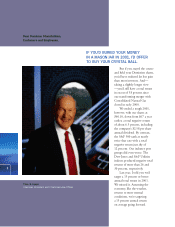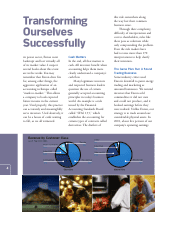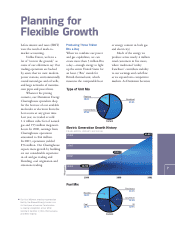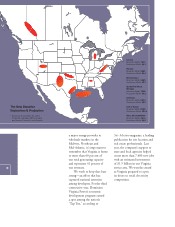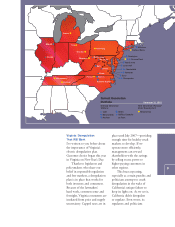Dominion Power 2001 Annual Report Download - page 6
Download and view the complete annual report
Please find page 6 of the 2001 Dominion Power annual report below. You can navigate through the pages in the report by either clicking on the pages listed below, or by using the keyword search tool below to find specific information within the annual report.
4
its power sector, Enron went
bankrupt and lost virtually all
of its market value. I suspect
several books about this event
are in the works. You may
remember that Enron drew fire
for, among other things, the
aggressive application of an
accounting technique called
“mark-to-market.” This allows
a company to book expected
future income in the current
year. Used properly, this practice
can accurately and meaningfully
serve investors. Used abusively, it
can be a house of cards waiting
to fall, as we all witnessed.
Cash Matters
In the end, all that matters is
cash. All investors benefit when
accounting helps them more
clearly understand a company’s
cash flow.
Many legitimate investors
and respected business leaders
question the use of certain
generally accepted accounting
principles in today’s business
world. An example is a rule
issued by the Financial
Accounting Standards Board
called “SFAS 133,” which
establishes the accounting for
certain types of contracts called
derivatives. The drafters of
this rule somewhere along
the way lost their common
business sense.
Through their complexity,
difficulty of interpretation and
cost to shareholders, rules like
these pose as solutions while
only compounding the problem.
Even the rule makers have
had to issue more than 170
interpretations to help clarify
their intention.
The Game Plan: Run A Sound
Trading Business
Some industry critics used
Enron’s downfall to paint energy
trading and marketing as
unsound businesses. We remind
investors that Enron sold
commodities it did not own
and could not produce, and it
booked earnings before they
were realized. Unlike Enron, our
strategy is to trade around our
considerable physical assets. In
2001, about five percent of our
company’s operating earnings
Revenue by Customer Class
As of Year End 2001
Electricity
Residential
Public Authority
Industrial
Natural Gas
Residential
Commercial
Industrial
10%
11% 21%
5%
71%
Commercial
31% 44%
Transforming
Ourselves
Successfully
Other
3%
Resale
4%




